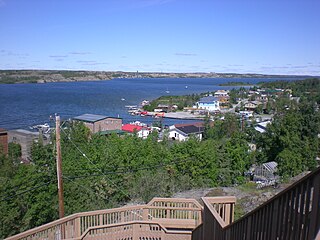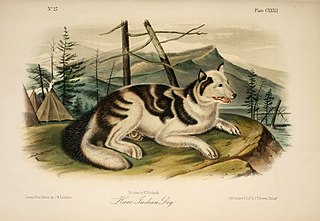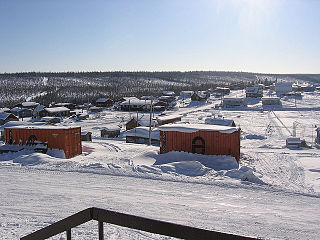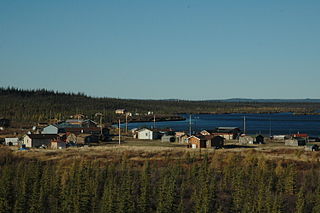
The Northwest Territories is a federal territory of Canada. At a land area of approximately 1,127,711.92 km2 (435,412.01 sq mi) and a 2021 census population of 41,070, it is the second-largest and the most populous of the three territories in Northern Canada. Its estimated population as of the second quarter of 2024 is 44,920. Yellowknife is the capital, most populous community, and only city in the territory; its population was 20,340 as of the 2021 census. It became the territorial capital in 1967, following recommendations by the Carrothers Commission.

Yellowknife is the capital, largest community, and only city in the Northwest Territories, Canada. It is on the northern shore of Great Slave Lake, about 400 km (250 mi) south of the Arctic Circle, on the west side of Yellowknife Bay near the outlet of the Yellowknife River.

Tulita, which in Slavey means "where the rivers or waters meet", is a hamlet in the Sahtu Region of the Northwest Territories, Canada. It was formerly known as Fort Norman, until 1 January 1996. It is located at the junction of the Great Bear River and the Mackenzie River; the Bear originates at Great Bear Lake adjacent to Deline.

Aklavik is a hamlet located in the Inuvik Region of the Northwest Territories, Canada. Until 1961, with a population over 1,500, the community served as the regional administrative centre for the territorial government.

The Sahtú or North Slavey are a Dene First Nations people of the Athabaskan-speaking ethnolinguistic group living in the vicinity of Great Bear Lake, Northwest Territories, Canada. The Sahtú peoples live in Colville Lake, Deline, Fort Good Hope, Norman Wells and Tulita which form the Sahtu Region of the NWT. The Dene of the region are represented by the Sahtu Dene Council who, in 1993, signed the Sahtu Dene and Metis Comprehensive Land Claim Agreement. Sahtú groups include the Hare Dene, Bear Lake Dene, and Mountain Dene. They call themselves also Ɂehdzo Got’ı̨ne.

Norman Wells is a town located in the Sahtu Region, Northwest Territories, Canada. The town, which hosts the Sahtu Regional office, is situated on the north side of the Mackenzie River and provides a view down the valley of the Franklin and Richardson mountains.

Fort Good Hope, is a charter community in the Sahtu Region of the Northwest Territories, Canada. It is located on a peninsula between Jackfish Creek and the east bank of the Mackenzie River, about 145 km (90 mi) northwest of Norman Wells.

Colville Lake is a settlement corporation located in the Sahtu Region of the Northwest Territories, Canada. The community is located 50 km (31 mi) north of the Arctic Circle, on a lake of the same name, and is northeast of Norman Wells. This settlement is the administrative office of the Behdzi Ahda band government. The community is likely named for Hudson's Bay Company Governor Andrew Colvile.

The Sahtu Region is an administrative region in Canada's Northwest Territories. Coterminous with the settlement region described in the 1993 Sahtu Dene and Metis Comprehensive Land Claim Agreement, 41,437 km2 (15,999 sq mi) of the Sahtu is collectively owned by its Indigenous Sahtu (Dene) and Métis inhabitants. Although the region's population is predominantly First Nations, a significant non-Indigenous presence exists in Norman Wells, the regional office, established in 1920 to serve the only producing oilfield in the Canadian Territories. Considered to be of vital strategic importance during World War II in the event of a Japanese invasion of Alaska, the region's petroleum resources were exploited by the United States Army with the Canol Project, but the pipeline never became necessary and ultimately operated for less than one year.

The Yellowknife Catholic School Board is the religious school board responsible for Catholic schools in Yellowknife, Northwest Territories, Canada. The board is made up of a chair and five other elected members.

The Tłı̨chǫ Government, or Tłı̨chǫ Ndekʼàowo, is a First Nations organization representing the Tłı̨chǫ Nation, Dene people of the Northwest Territories, Canada, and covering much of their traditional territory, Tłı̨chǫ Ndé, within the larger Dene Country of Denendeh. The devolved government was created in 2005 when the Tłı̨chǫ Nation ratified the Tłı̨chǫ Agreement with the Government of Canada.
Norman Yakeleya is a Canadian territorial level politician from Northwest Territories, Canada.

The Charter Community of Délı̨nę is located in the Sahtu Region of the Northwest Territories, Canada, on the western shore of Great Bear Lake and is 544 km (338 mi) northwest of Yellowknife. Délı̨nę means "where the waters flow", a reference to the headwaters of the Great Bear River, Sahtúdé. It is the only settlement on the shores of Great Bear Lake as Fort Confidence was last used in the 1800s and Port Radium closed in 1982.

The South Slave Divisional Education Council (SSDEC) is the public school board for the South Slave Region of the Northwest Territories, Canada. Its responsibility includes all schools within the five communities of the South Slave. Specifically, it is responsible for schools in the communities of Fort Resolution, Fort Smith, K'atl'odeche First Nation, Hay River, and Łutselk'e. Given the vast distances between communities, and the relatively small populations, the eight schools of the South Slave range in enrolment from 60 to 240 students with a total of 1,300. Although considered part of the South Slave Region by other departments of the Government of the Northwest Territories, the communities of Fort Providence and Kakisa are served by the Dehcho Divisional Education Council and not the SSDEC.

The COVID-19 pandemic in the Northwest Territories is part of an ongoing global pandemic of coronavirus disease 2019 (COVID-19), an infectious disease caused by severe acute respiratory syndrome coronavirus 2 (SARS-CoV-2). As of February 23, 2022, there have been 8,495 confirmed cases in Northwest Territories with 7,999 recoveries and 19 deaths.
The Beaufort Delta Divisional Education Council or Beaufort-Delta Divisional Education Council is the public school board for the Inuvik Region, identical to Region 1, a census division in the Northwest Territories. Located in Inuvik the education council represents nine schools in eight communities.

The Dehcho Divisional Education Council is the public school board for the Dehcho Region, in the Northwest Territories. Located in Fort Simpson the education council represents nine schools in eight communities.

The Tłı̨chǫ Community Services Agency is the public school board, as well as overseeing health and social services for the North Slave Region communities that are part of the Tłı̨chǫ Government. Located in Behchokǫ̀ the education council represents five schools in four communities.
















